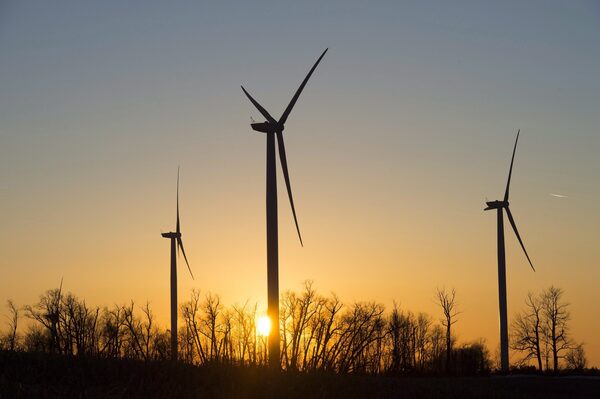
Wind turbines spin in front of the setting sun near Orono, Ont., on March 4, 2017.Frank Gunn/The Canadian Press
An expert panel appointed by the federal government to accelerate the growth of Canada’s sustainable finance market has disbanded at the end of a three-year mandate marked by frustrations over a lack of progress in implementing its major recommendations.
The panel, the Sustainable Finance Action Council, was formed in 2021 to devise ways of attracting capital focused on mitigating climate change.
It developed a framework for a made-in-Canada taxonomy of climate-focused investments, which would categorize them as either “green” or “transitionary” depending upon the levels of greenhouse gas emissions they produce and whether they are likely to continue to be used well into the future. The group also recommended a speedy move to mandatory climate-related financial disclosure for private companies.
Ottawa has yet to implement these things, and panel members have publicly expressed frustration that the government has not provided them with the direction and funding necessary to take the next steps toward finalizing the taxonomy. They had expected to hold meetings with industry, environmental and government officials. The group has argued that Canada’s competitiveness in the race for capital is at risk, as other countries move ahead with similar policies.
“We’re done. I believe, and I think that the membership agrees, that we have executed on the mandate. We’ve provided our recommendations,” Kathy Bardswick, the panel’s chair, said in an interview on Wednesday. “We continue to hope that the fall economic statement commitments that were made will be seen through, but that’s yet to be seen,” she added, referring to the federal economic update released in November.
In the economic statement, Ottawa said it would provide $1.5-million to the Finance Department to fund consultations on a green investment taxonomy with regulators, financial players, industry officials and other experts. But it did not commit to implementing such a taxonomy.
The panel, which was made up of 25 experts from the banking, insurance and pension sectors, has said that putting climate-focused investment policies into action is critical to attracting an estimated $115-billion a year in capital required to reduce emissions to net zero by 2050.
Ms. Bardswick said she has delivered her final report to Finance Minister and Deputy Prime Minister Chrystia Freeland and Environment Minister Steven Guilbeault. In it, she offers recommendations to the government for running future expert panels. A key one is that the government should foster more interaction between the experts and public officials.
“We didn’t have enough back and forth with senior policy decision makers, in our view,” Ms. Bardswick said.
“So if they set out to do that again, which I’m sure they will because they have done that historically – set up these commissions – they really do need to rethink to what extent they’re going to be interacting throughout, to be able to shape the thinking and the policy discussions and deliberations that that are under way in the country. Because it was really quite frustrating for the membership.”
Ms. Bardswick, a former top insurance executive, said the panel’s members also reported positive outcomes from the process. For instance, some said they had gained experience in working across the various financial sectors, which Ms. Bardswick said will help to strengthen the country’s sustainable finance network.
“They all felt we did good work there,” Ms. Bardswick said. “The real issue is, will the government move?”
Katherine Cuplinskas, a spokesperson for Ms. Freeland, said the government recognizes the important work of the panel and its chair. She said Ottawa is “developing options” to formalize mandatory climate-related disclosure for private companies, and is using the council’s work to create a taxonomy that will help achieve the country’s net-zero goal.
“This work is being done in consultation with regulators, the financial sector, industry and independent experts, and is being supported by external technical experts,” Ms. Cuplinskas said.
The council delivered its taxonomy roadmap in fall 2022. The plan recommends excluding new oil and gas projects from the categorization system. This prompted pushback from backers of the natural gas and liquefied natural gas sectors, who argue that those fossil fuels could lower emissions by replacing coal-fired power.
Ms. Bardswick said she believes the natural gas lobby has significant influence in Ottawa, especially as the industry throws its support behind Indigenous communities taking equity stakes in LNG projects. But that should not hold up the entire taxonomy process, she said.
Even with the taxonomy in place, investors would still be free to invest in projects that do not fall under the green and transition labels, and bank executives have made that point to the Finance Department, she said.
“I think the issue is all about the government endorsing a taxonomy that would exclude new exploration for energy,” she added.
Jeffrey Jones writes about sustainable finance and the ESG sector for The Globe and Mail. E-mail him at jeffjones@globeandmail.com.
 Jeffrey Jones
Jeffrey Jones